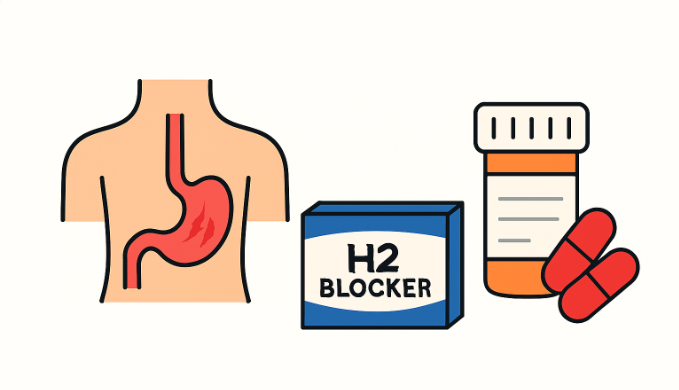
Over-the-Counter GERD Medicines: Choosing the Right OTC
|
|
Time to read 4 min
|
|
Time to read 4 min
Have you been confused about what “one-size fits all" medicine would work for you every time your GERD comes up?
Well, you are not alone.
More than 60 million Americans experience heartburn each month, and if you are one of them, you know how frustrating it can be.
In this guide, we will break down the three most common treatments: Antacids, H2 Blockers, and PPIs, and reveal if they are really solving the problem or just covering it up?
Already tired of scrolling through blogs and wondering what might work for you?
Don't worry, Claisen got you covered!
Gastroesophageal reflux disease (GERD) happens when stomach acid flows back into the esophagus, causing irritation.
Common symptoms include:
Burning sensation in the chest after eating
Sour or bitter feeling in the mouth
Difficulty swallowing
Feeling of a lump in the throat
Chronic cough
Let Claisen take the guesswork out of your routine with personalized solutions designed to target your problem at its root, so you can feel better, faster.
It can lead to rebound acidity in case of overuse.
It may cause constipation or diarrhea because of its ingredients
They don't prevent acid production, just neutralizes it. Therefore, the relief is temporary
H2 blockers reduce acid production by targeting histamine receptors in the stomach lining but only till a certain point.
A case report featured in the East African Scholars Journal of Medicine and Surgery, described a patient developing acute hepatitis after starting famotidine (a H2 Blocker).
Liver enzymes increased, and normalized only after the drug was discontinued.
While H2 Blockers can be helpful in a moment it can:
Take longer to kick in (30 minutes or more)
Effectiveness may reduce over time as tolerance might build up
It has side effects like headaches, dizziness, and fatigue
Frequent usage leads to acid hypersecretion
Note: Acid Hypersecretion may even lead to serious conditions like peptic-ulcers, and other gastrointestinal issues. It is also one of the reasons why GERD is caused in the first place.
PPIs block the enzyme system that produces the acid, offering a long-lasting relief for GERD. However, their continuous use has resulted in serious health issues like nutrient malabsorption.
It can take days to reach full effectiveness
There is an increased risk of kidney disease and bone fractures
It may disrupt gut microbiome and make the gut more prone to infections
Tired of experimenting and wondering what might work for your GERD?
Occasional, mild heartburn: start with antacids.
Frequent but manageable episodes: consider H2 blockers.
Daily, severe reflux: PPIs
Do not exceed the maximum daily dose.
Follow instructions on timing relative to meals.
Identify your GERD pattern before choosing an OTC medicine: antacids for occasional flare-ups, H2 blockers for frequent episodes, and PPIs for daily or severe reflux.
Gentle exercise helps with GERD and digestion: simple activities like walking, yoga, and breathing exercises can relieve symptoms naturally and support your gut health in long-term.
Skip the guesswork with people who claim they have a "solution". Get a personalized relief plan that stops the cause of your GERD
Claisen is a 100% online platform designed to provide personalized relief for bloating, gas, and heartburn: perfect for people looking for safe and effective options to treat their GERD.
With Claisen, you can skip the guesswork and get instant relief.
OTC antacids neutralize existing stomach acid on contact, providing rapid relief from heartburn and acid reflux. They work within minutes and are ideal for occasional or mild GERD.
H2 receptor blockers are best for people who experience GERD symptoms more than twice a week or have nighttime reflux.
Antacids are generally considered safe for older children and pregnant women. However, always check with a pediatrician or obstetrician before starting any GERD treatment.
Proton pump inhibitors block the final step of gastric acid secretion, providing up to 24 hours relief from GERD per dose.


